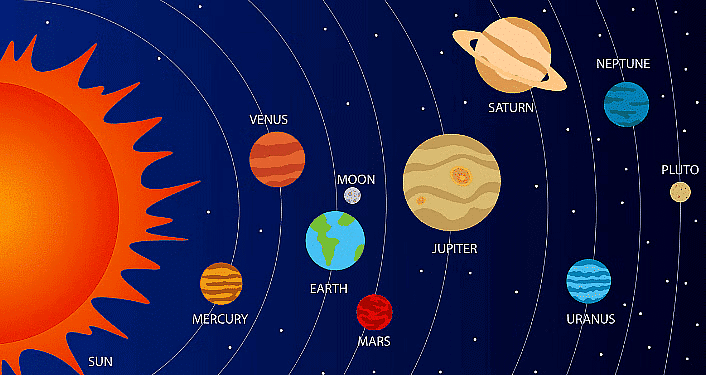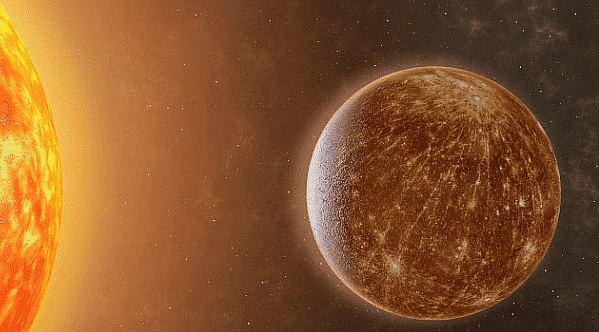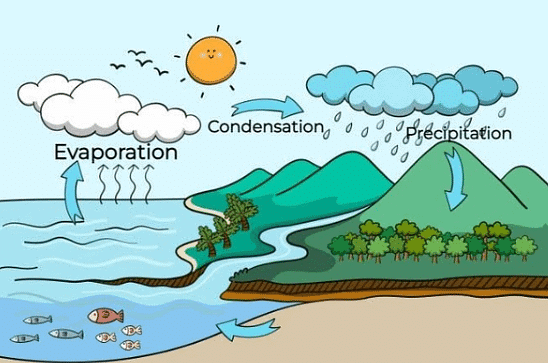The Earth-Our World - 2 Class 5 Worksheet SST
 Q1: Fill in the Blanks:
Q1: Fill in the Blanks:
(i) The Earth is the _____ planet from the Sun in our solar system.
Ans: third
(ii) The Earth has three main layers: the _______, the mantle, and the core.
Ans: crust
(iii) The imaginary line that runs from the North Pole to the South Pole is called the _______.
Ans: equator
(iv) The four main directions are ______, south, east, and west.
Ans: north
(v) The study of the Earth's physical features, climate, and resources is called _______.
Ans: geography
(vi) The largest body of water on Earth is the _______ Ocean.
Ans: Pacific
(vii) The process of water turning into vapor and rising into the air is called _______.
Ans: evaporation
(viii) The process of water vapor turning back into liquid water is called _______.
Ans: condensation
(ix) The outermost layer of the Earth is called the _______.
Ans: crust
(x) The natural home or environment of a plant, animal, or organism is its _______.
Ans: habitat
Q2: Multiple Choice Questions (MCQs)
(i) Which is the smallest planet in our solar system?
(a) Earth
(b) Venus
(c) Mercury
(d) Mars
Ans: (c)
Mercury is the smallest planet in our solar system.

(ii) Which gas do plants use to make their own food?
(a) Oxygen
(b) Nitrogen
(c) Carbon Dioxide
(d) Hydrogen
Ans: (c)
Plants use carbon dioxide to make their own food through photosynthesis.
(iii) What causes day and night on Earth?
(a) The rotation of the Moon
(b) The rotation of the Sun
(c) The rotation of the Earth
(d) The movement of the stars
Ans: (c)
The rotation of the Earth causes day and night as different parts of the Earth face the Sun.
(iv) What is the Earth's largest continent?
(a) Africa
(b) Europe
(c) Asia
(d) North America
Ans: (c)
Asia is the Earth's largest continent.
(v) What is the process by which plants release water vapor into the air?
(a) Transpiration
(b) Precipitation
(c) Condensation
(d) Evaporation
Ans: (a)
Transpiration is the process by which plants release water vapor into the air.
Q3: True and False
(i) The Earth is the only planet in our solar system that supports life.
Ans: False
While Earth is the only planet known to support life, scientists are still exploring the possibility of life on other planets.
(ii) The equator is an imaginary line that runs from the North Pole to the South Pole.
Ans: False
The equator is an imaginary line that circles the Earth horizontally, dividing it into the Northern and Southern Hemispheres.
(iii) The crust is the innermost layer of the Earth.
Ans: False
The crust is the Earth's outermost layer.
(iv) The Pacific Ocean is the smallest ocean on Earth.
Ans: False
The Pacific Ocean is the largest and deepest ocean on Earth.
(v) Rocks can change from one form to another through processes like erosion and weathering.
Ans: True
Rocks can change through processes like erosion (breaking down) and weathering (wearing away due to natural forces).
Q4: Match the Following:
(i) Weathering and Erosion → (a) The study of Earth's physical features
(ii) Geography → (b) Process of soil and rocks breaking down
(iii) Atmosphere → (c) Outermost layer of Earth
(iv) Crust → (d) Mixture of gases around Earth
(v) Evaporation → (e) Transformation of water into vapor
Ans:
(i) Weathering and Erosion →(b) Process of soil and rocks breaking down
(ii) Geography → (a) The study of Earth's physical features
(iii) Atmosphere → (d) Mixture of gases around Earth
(iv) Crust → (c) Outermost layer of Earth
(v) Evaporation → (e) Transformation of water into vapor

Q5: Short Answer Questions
(i) Explain how the Earth's rotation causes day and night.
Ans: The Earth rotates on its axis. As it rotates, different parts of the Earth are either facing the Sun (daytime) or facing away from the Sun (nighttime), causing the cycle of day and night.
(ii) Describe the water cycle and its different stages.
Ans: The water cycle is the continuous movement of water on, above, and below the Earth's surface. It involves processes like evaporation (water turning into vapor from water bodies), condensation (water vapor turning into clouds), precipitation (water falling back to the Earth as rain or snow), and collection (water gathering in oceans, rivers, etc.).
(iii) What is the importance of the equator in terms of climate and geography?
Ans: The equator is an important line of latitude that circles the Earth horizontally, dividing it into the Northern and Southern Hemispheres. Its location influences climate patterns and seasons. Areas near the equator receive more direct sunlight, leading to warmer temperatures, while areas farther from the equator experience more variation in seasons.
(iv) How does erosion change the Earth's surface? Provide an example.
Ans: Erosion is the process of wearing away rocks and soil by natural forces like wind, water, and ice. For example, a river flowing through a valley over a long time can erode the surrounding land, creating a new landscape.
(v) Why is it important for us to conserve natural resources?
Ans: Conserving natural resources is important to ensure their availability for future generations and to maintain the balance of ecosystems. Resources like water, forests, and minerals should be used sustainably to prevent depletion and environmental harm.
|
33 videos|376 docs|50 tests
|
FAQs on The Earth-Our World - 2 Class 5 Worksheet SST
| 1. What is the importance of Earth in our daily lives? |  |
| 2. How does the Earth contribute to climate change? |  |
| 3. What are the major threats to the Earth's biodiversity? |  |
| 4. How can individuals contribute to the conservation of the Earth? |  |
| 5. What are the consequences of ignoring the importance of the Earth? |  |
















